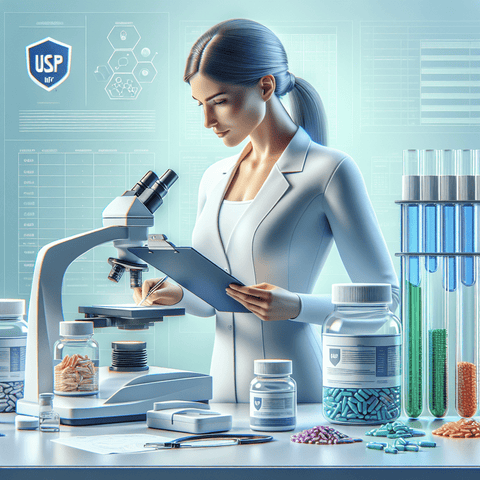Introduction
The global nutritional supplement industry has experienced tremendous growth over the past few decades, driven largely by increasing awareness around health, wellness, and preventative medicine. Consumers are turning to multivitamins, herbal blends, probiotics, and specialty supplements like vitamin D, magnesium, and omega-3s to enhance their daily routines. However, alongside this surge in demand lies a growing concern: how do consumers know what they’re actually ingesting is safe, accurately labeled, and effective?
Despite the popularity of supplements, the industry remains less regulated compared to pharmaceuticals. In many regions, including the European Union and the United States, supplements can be legally sold without being verified by government health authorities before going to market. This regulatory gap leads to inconsistencies in potency, purity, and safety. That’s where third-party testing comes into play.
Third-party testing refers to a process where independent labs, unaffiliated with the supplement brand or manufacturer, evaluate a product to verify its quality, purity, and potency. This practice builds credibility and helps ensure that the supplement contains what the label claims—nothing more and nothing less. In this article, we’ll explore what third-party testing means for supplements, the science behind it, and why it ultimately matters to you, the health-conscious consumer.
Third-Party Testing in Nutritional Supplements: What It Is and Why You Should Care
At its core, third-party testing is an independent analysis conducted by certified laboratories that have no financial stake in the outcome. These labs rigorously evaluate supplements using validated scientific methods. The goal? To confirm that each batch of product meets stringent standards for identity, strength, composition, and the absence of harmful contaminants.
Unlike in-house testing—where companies use their internal labs—third-party testing ensures impartiality. In-house labs might cut corners or overlook irregularities due to internal pressures or biases. By using independent facilities unaffiliated with the brand, third-party testing removes these conflicts of interest and boosts consumer trust.
Leading organizations offering independent testing include NSF International, United States Pharmacopeia (USP), and ConsumerLab. Each has developed strict guidance and protocols to examine whether products live up to their marketing. For athletes who rely on clean supplements, for instance, NSF Certified for Sport is a symbol that guarantees the absence of banned substances.
The benefits of such testing are well-documented. For example, a study examining popular turmeric supplements found wide variation in actual curcumin content — some products provided nearly none of the active compound. But those that underwent third-party verification consistently delivered what they promised on the label. This is a concrete example of how third-party testing bridges the gap between marketing claims and scientific reality.
When you choose supplements with third-party testing, you are embracing transparency and making a more informed choice. In categories such as magnesium or omega-3s, where purity and source matter immensely, this assurance becomes critical. With third-party testing in place, you gain peace of mind knowing the supplement in your hand is both safe and efficacious.
Independent Supplement Testing: Strengthening Consumer Confidence
One of the biggest challenges in the supplement industry is maintaining credibility in a competitive and often saturated market. Independent supplement testing serves as a stronghold against misinformation, misleading claims, and ineffective products. In a landscape filled with thousands of brands, the presence of neutral oversight fosters consumer confidence and helps weed out low-quality or potentially dangerous products.
By definition, independent testing is conducted by labs not owned or controlled by the supplement manufacturer. This disconnection minimizes the risk of bias and ensures transparency. Accredited institutions such as Eurofins Scientific, NSF International, and ALS Laboratories uphold rigorous quality assurance protocols when assessing nutritional products.
These providers perform various analyses including chemical composition verification, microbial contamination assessments, heavy metal screening, allergen profiling, and more. Their findings often serve as the basis for product labels, safety warnings, and certification decisions. More importantly, they reveal discrepancies that in-house teams might overlook or choose to ignore.
For instance, a widely cited case involved protein powders tested by ConsumerLab, where several samples were found to contain significantly less protein than advertised and elevated levels of lead. Independent testing caught these inconsistencies early—consumers who relied solely on branding or marketing would have never known.
By fostering accountability and offering an unbiased lens through which supplements are examined, independent testing becomes not just a tool but an essential component of informed health decisions. Whether you're purchasing a DHA/EPA formula or an energy-focused B-complex, third-party verification offers the confidence that your choice is both smart and safe.
Certified Supplement Quality: What Those Seals Really Mean
Product packaging often displays eye-catching seals and logos such as "NSF Certified," "USP Verified," or "Informed-Choice Approved." But what do these certifications mean? And more importantly, how do they help you select the best supplement for your needs?
Certification labels reflect rigorous testing and auditing processes carried out by authorized third-party bodies. To earn such designations, products must undergo extensive verification for potency (does it contain the right amount of active ingredient?), purity (is it free from contaminants?), and identity (does it contain what it says it does?). These tests are repeated batch-wise, ensuring consistent quality over time.
Let’s break down a couple of the most respected certifications:
- USP Verified: Supplements with the USP mark have passed stringent criteria involving ingredient identity, potency, and manufacturing practices set forth by the U.S. Pharmacopeia.
- NSF Certified: NSF tests supplements for contaminants, verifies label accuracy, and audits manufacturing facilities. The "Certified for Sport" variant additionally screens for substances banned by athletic organizations.
- Informed-Sport: Geared toward athletes, this certification ensures every batch is tested for substances banned by the World Anti-Doping Agency (WADA).
It's crucial to not just trust these logos blindly. Consumers should visit the certifying agency’s website to cross-check the product listing. Some supplements use similar but unofficial icons to create a false sense of legitimacy. Always verify.
Certified quality impacts not just your trust but also the supplement’s efficacy. A high-quality vitamin K supplement that has been independently tested is more likely to deliver consistent benefits than a non-certified alternative. Certification stands as a testament to diligence, reliability, and scientific integrity.
Supplement Lab Verification: Behind-the-Scenes of Supplement Testing
Ever wondered what happens when a supplement bottle is sent off for third-party testing? The process is scientific and methodical. Experts perform a series of tests in accredited laboratories, applying validated procedures to confirm the product’s identity, dosage, and purity.
The typical lab verification process includes:
- Ingredient identity testing using chromatography or mass spectrometry to validate that what’s claimed on the label is actually present.
- Potency analysis to quantify the active compounds and ensure they meet specified dosages.
- Contaminant screening for heavy metals such as lead, arsenic, mercury, as well as biological contaminants like Salmonella or E. coli.
- Allergen testing for gluten, soy, dairy, or nuts depending on the labeling claims.
These evaluations follow protocols anchored in Good Manufacturing Practices (GMP), which are regulatory guidelines ensuring consistency, cleanliness, and traceability in production. Brands committed to long-term excellence and transparency often integrate third-party lab results into their marketing, empowering consumers with hard data rather than vague promises.
So next time you choose a supplement from categories like vitamin C or omega-3s, consider whether the product has been subjected to such intense scrutiny. Lab verification may happen behind the scenes, but its effects are manifest: cleaner, safer, and label-accurate products that support your health goals.
Unbiased Product Testing: Guarding Against Misleading Claims
The supplement world is awash with bold claims and persuasive marketing—“boosts energy instantly,” “detox in a bottle,” “miracle ingredient from nature.” Many of these statements lack scientific backing. Without unbiased product testing, consumers may fall victim to clever slogans that don’t hold up under scrutiny.
Third-party evaluations help cut through the marketing noise by producing transparent, data-driven insights. Whether it's disproving exaggerated claims or confirming product efficacy, unbiased testing lets science, not sales pitches, guide the narrative.
Consider supplement categories targeting vulnerable groups, such as seniors requiring vitamin D for bone maintenance or pregnant women needing folic acid. These consumers rely heavily on accurate dosing and safety data. Independent testing minimizes risks of contamination or mislabeling that could cause harm.
In recent years, many trending ingredients, such as CBD, ashwagandha, or turmeric, have gained traction before robust clinical evidence accumulated. In such cases, unbiased lab reports provide much-needed clarity about real-world product integrity.
Interpreting test results, such as Certificates of Analysis (COA), can seem daunting. Fortunately, third-party labs often provide consumer-facing summaries that illustrate test outcomes in simplified formats. Learning to navigate these documents empowers users to distinguish between genuinely beneficial supplements and merely hyped ones.
Supplement Purity Analysis: Ensuring Safe and Effective Ingredients
One of the most vital aspects of third-party testing involves purity analysis. Simply put, this is about detecting what should and shouldn't be in your supplement. From pesticides to plasticizers, heavy metals to pharmaceutical contaminants, purity tests act as the front-line defense for consumer health.
A high-quality supplement should be free from harmful substances and disclosed fully on the label. Unfortunately, some unscrupulous manufacturers introduce risk through adulteration—adding prescription drugs, harmful chemicals, or cheap fillers to cut costs or boost perceived effectiveness.
Consider omega-3 supplements sourced from fish oil. Without thorough analysis, these could contain traces of mercury or PCBs if derived from low-quality sources. Opting for purified, certified omega-3 supplements with full lab access reports ensures no unwanted compounds sneak through.
In the event of contamination, the consequences can be serious— from allergic reactions to toxin-induced health complications. That’s why purity testing is a public health issue, not just a matter of consumer preference.
Fortunately, many supplement brands working with top-tier testing labs offer downloadable purity reports or COAs, especially for single-ingredient products like magnesium or vitamin K. Taking the time to read these disclosures goes a long way in ensuring that you’re putting only clean, tested compounds into your body.
Conclusion: Investing in Your Health Through Transparency and Testing
The importance of third-party testing in the supplements industry cannot be overstated. It serves as a critical checkpoint for honesty, safety, and quality assurance. As consumers increasingly prioritize wellness, they must also demand transparency and responsibility from the brands they trust.
Armed with the knowledge of certification labels, lab procedures, and unbiased test interpretations, you can make smarter, safer supplement choices. Whether you're choosing a basic multivitamin or a high-potency magnesium formula, confirm that the product has passed scientifically valid third-party evaluations.
Your health is an investment. By aligning yourself with verified, independently tested supplements, you're not only optimizing your wellness routine—you're contributing to a more ethical, evidence-based supplement marketplace.
Q&A Section
-
Q: What is third-party testing?
A: Third-party testing is an independent evaluation of supplements by accredited laboratories to verify quality, purity, potency, and safety. -
Q: Why is it better than in-house testing?
A: Third-party labs have no financial interest in the product, reducing bias and increasing result reliability. -
Q: How can I tell if a supplement is third-party tested?
A: Look for verified certifications like USP, NSF, or Informed-Choice, and check the certifier’s official website to verify listing. -
Q: Are all supplements required to be independently tested?
A: No, third-party testing is voluntary but strongly recommended to ensure safety and quality. -
Q: Where can I find tested supplements?
A: Websites like Topvitamine.com stock a curated range of high-quality, tested nutritional supplements.
Important Keywords
Third-party testing, independent supplement testing, certified supplement quality, supplement lab verification, unbiased product testing, supplement purity analysis, third-party tested supplements, supplement safety, supplement transparency, evidence-based supplements, GMP, USP Verified, NSF Certified, identity testing, certification labels, omega-3 purity, vitamin D testing, supplement quality assurance.



